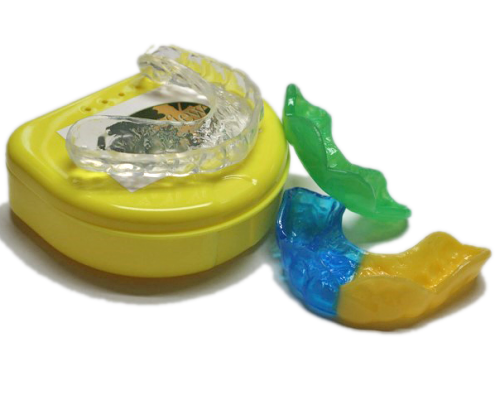Night Guard
The first question to ask is: What is a dental night guard?
This is a device used to treat the condition known as bruxism or teeth grinding. It is worn over either the top or bottom teeth to provide a cushion to prevent grinding. This condition more commonly occurs at night and can cause quite a considerable amount of jaw pain and discomfort. Headaches can also be a result of bruxism.
A dental night guard can be made of acrylic or plastic. An acrylic dental night guard is less flexible than a plastic one which means that it will stay in place more effectively. They are more expensive than plastic.
A dental night guard can be bought off the shelf from drugstores or even online. These guards, while cheaper and readily available, are often not very comfortable as they do not fit properly. They have not been specifically made for the wearer. They can be molded by placing in hot water but even then the fit may not be quite right. Not surprisingly, dentists do not recommend this type of dental night guard.
For a custom fitted dental night guard a dentist will take an impression of the teeth and then the guard can be made to fit the patient exactly. Children who need to wear a dental night guard will need to have one made each year as they grow. However, guards fitted and made by dentists can be very expensive up to $500. Is the relief obtained from wearing a custom fitted dental night guard worth the high cost?
When making the decision whether to purchase a custom made dental night guard take into consideration how much repairing worn down teeth would cost. Teeth capping and dentures cost a lot of money, so maybe a dental night guard is the answer. Remember the old saying “prevention is better than cure”.
Benefits of Wearing a Dental Night Guard
The benefits of wearing a dental night guard are many. These include:
- Stopping tooth grinding
- Improving breathing
- Easing the ache in neck and shoulders
- Reducing headaches
- Lessening jaw stress
- Protecting teeth from damage caused by grinding
- Reducing chance of teeth chipping or loosening
- And wearing a dental night guard may even reduce snoring!
To effectively stop teeth grinding a dental night guard should be worn nightly. Over time a person may stop grinding their teeth so the device need not be worn. Children usually outgrow teeth grinding.
A dental night guard is easy to maintain. It should be cleaned with toothpaste after each use and rinsed thoroughly.
The use of a dental night guard can make the lives of those who suffer from bruxism so much easier. It will mean that they sleep better, have fewer aches and pains, and their teeth will be kept in a much better condition. The biggest decision to be made is whether to buy a ready made device or have one made for you by a dental professional.
 WEARING A MOUTH GUARD MAKES GOOD SENSE.
WEARING A MOUTH GUARD MAKES GOOD SENSE.